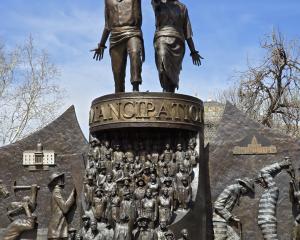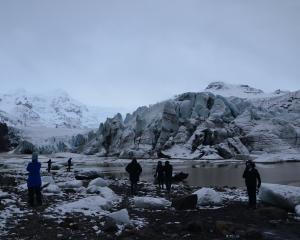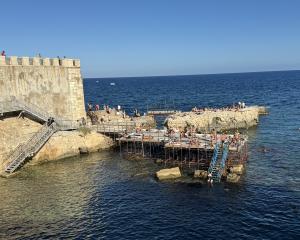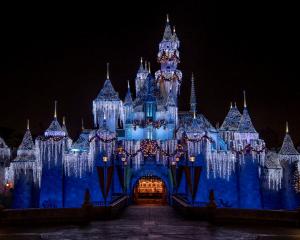Sports Writer Alistair McMurran visited Moldova this year and has now been to 195 countries and territories on the Los Angeles-based Travellers Century Club list. His travelling companion David Horne has been to 258 of the world's 321 countries, more than any other New Zealander.
Moldova is world famous for its vineyards and wineries. The Milestii Mici Winery was entered in the Guinness Book of World Records in 2005.
It was registered for having the biggest wine collection in the world with 1.5 million bottles. It now has nearly 2 million bottles.
''It really has more than that but for commercial reasons it limited the number to that,'' our winery guide Natalia said.
''It has over 65 million litres of wine stored underground.''
The Milestii Mici Winery is just outside the capital city of Chisinau and was established in 1916. It employs 250 people and is surrounded by acres of its own vineyards.
At the entrance of the winery there is imitation red wine and Champagne tumbling out of fountains into overgrown glasses.
The winery has more than 200km of underground roadways. We travelled by car to a depth of 85m, stopped at a natural waterfall and walked into a vault where vintage wine is stored.
Each group of bottles lies flat and is enclosed in a case that contains between 150 and 1500 bottles.
The oldest stored wine dates back to 1972. White wine can be kept for 25 years, reds for 56 years and classic for 200 to 300 years.
Last year a Chinese man purchased a vintage collection.
We were shown a ''secret room'' where wine was stored after Soviet leader Mikhail Gorbachev announced his ''Dry Law'' that was intended to stop Russians drinking too much. More than 2000 bottles were stored in 1985 in case the Soviets came to destroy the wine.
Wine is kept in barrels for two months before being bottled.
In the wine-tasting area we tried a white Sauvignon, a red Merlot and a sweet dessert Marguerite.
With the wine we were given a bowl of dried apples, plums and peanuts.
While we sipped the wine, two men dressed in native costume serenaded us with traditional Russian and Bavarian tunes on a piano accordion and violin. In the cool limestone tunnels thousands upon thousands of wine bottles are stored. They all lie flat.
There were photos of celebrities who had visited the winery, the most prominent being former United States president Jimmy Carter.
We stayed at the Best Western Flowers Hotel in Chisinau and Victor, the manager, arranged local tours for us.
Our driver was Metri, a jovial man who comes from Bulgaria and who jokes with the locals. He takes on extra work to help out his grandchildren who are aged 9 and 5. He showed us a photo of them at the beach.
Our guide for other tours in Moldova was Natalia Cojuhari (32), who studied languages at university and worked as a teacher for a short time before switching to tourism nine years ago.
''I only made 200 euros a month and that wasn't enough to support my parents as well,'' she said. She now works as incoming manager for ''Ways Business Solutions''.
We visited the 13th-century Cave Monastery of Orheiul that still operates as a Russian Orthodox Church and overlooks the Raut River.
In the vicinity are huge cliffs that contain another six complexes of interlocking caves. The remains of a Turkish bath house were located close to the river.
It was a Sunday morning when we visited the area and Mass was in progress when we entered the Church of the Virgin of the Ascension. It is a walled fortress that was built by the Mongols.
At the back of the church are small meditation cells where monks once lived.
Seven hundred people live in the small village of Trebujeni that is close to the church. There is no running water, so locals collect what they need from the village well which has become a meeting place for people.
We entered a small stone house with a low door.
''It was built this way to force people to bow to the gods as they entered,'' Natalia said.
It is a Russian-style village. Its domestic gardens are filled with fruit trees and vegetables. Wooden fences were painted in bright hues of blue and green.
Moldova was the bread basket of the Soviet Union in communist times.
Natalie is not a supporter of Mikhail Gorbachev, who is the darling of the West.
''We were a wealthy country under the USSR,'' she said.
''We produced food for the Soviet Union and had a space industry. We made space pencils, microchips and weapons for the USSR.''
In the Soviet days people were able to travel to all parts of the USSR without having to go through country borders.
There was also free education and medicine.
''We were very happy in Soviet times,'' Natalia said.
''Now 90% of the population have to pay for their education. Life is a lot harder now.
''The Moldovan grape crop suffered under Gorbachev's Dry Law when the grape crop was reduced from 300,000 hectares to 107,000.''
Natalie was a member of the Pioneers in Soviet days and felt that it gave stability to teenagers. There were no great differences in income.
''There were no super rich and no poor,'' she said.
''There were no jealousies.''
Otilia, a waitress at the hotel, had a different view.
''I have read what they did here,'' he said.
''Anyone who protested was sent to Siberia.''
The barman at the hotel aptly summed up the differences between the communist and the capitalist system.
He has a business degree and worked in Ireland for a time.
''I tried to get jobs but found it hard because I had no experience,'' he said.
''I would like to get into a bank.''
He was too young to remember the communist days but was told about the long queues and empty shops.
''Now you have everything in the shops but no money to buy them,'' he said.
Moldova
• The Republic of Moldova is a landlocked nation in Eastern Europe located between Romania to the west and Ukraine to the north, east, and south.
Capital: Chisinau.
Currency: Moldovan leu.
Government: Parliamentary republic.
President: Nicolae Timofti.
Prime Minister: Vlad Filat.
Population: 3,559,000.
Languages: Russian, Ukrainian, Gagauz, Moldovan (official).












